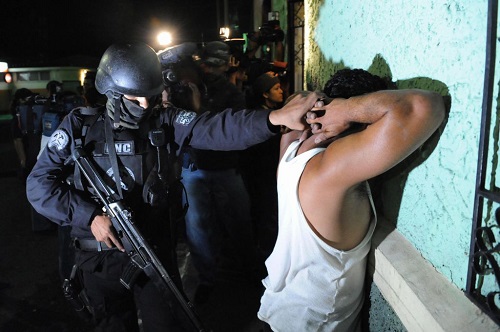AFP photo
By
Ricardo Swire
The United Nations International Commission against Impunity created the Comisión Internacional Contra la Impunidad en Guatemala (CICIG) to conduct a complex exercise reforming the country’s security and judiciary establishments.
Recently Guatemala’s ex-Interior Minister and ten Policia Nacional Civil (PNC) officers were formally charged with fraud and embezzlement of public funds, part of a criminal structure within the PNC. These ten indicted police officers were assigned to PNC units responsible for equipment purchases, supplies and financial audits, their main fraud achieved by falsifying government procurement of police patrol vehicles. PNC Sub-Station contracts were also used as part of the scam.
After Guatemala’s thirty-six year civil war, disillusioned military and national intelligence elements moved underground and became “guns for hire.” Today Guatemalan authorities fight burgeoning organized crime and corruption. El Gallito is a well-known drug cartel barrio in the capital Guatemala City. The neighborhood is controlled by “The Muchachos” who enforce cartel rules. On March 20, 2017 the street gang Barrio 18 conducted eight attacks against PNC stations and patrol cars in Guatemala City. Another assault was launched in western Quetzaltenango department.
Statistics calculate Guatemala’s criminal syndicates manage seven of twenty-two departments or provinces. The UN sponsored multinational probe exposed Guatemala’s 2000 to 2004 presidential chicanery. Guatemala’s former top politician for the period is scheduled for extradition to America on fraud and money laundering charges. The ex-president embezzled US$2.5 million received from Taiwan’s government, pocketing US$3.9 million pilfered from the Guatemalan Defence Ministry. Most of the misappropriated money was laundered via named American and European banks.
In February 2007 three visiting Congressmen from neighboring El Salvador were assassinated in Guatemala City. Four detained PNC officers confessed they were the triple murders’ triggermen. The cad Guatemalan law enforcers were contracted by an affiliate group of traffickers via electronic communication. The hitmen were informed the Salvadorian Congressmen were drug couriers for a rival organization. Guatemala has matured as an outpost for expanding Mexican cartels. Los Zetas members control several northern and western border crossings.
Areas close to Coban city in central Guatemala are supervised by the Mexican cartel. On the southern border shared with Mexico rival Sinaloa Cartel members team up with kindred Guatemalan criminal characters. Within Huehuetenango, a remote city in the highlands of western Guatemala, domestic pro-Sinaloa Cartel sects attempt to substitute official state representation. Alternative jobs have been created, social services and domestic celebrations financed. Both Mexican Cartels have airstrips and warehouses in remote parts of Guatemala’s jungle.
Reports advise internal security operations dismantled Los Zetas bases in Guatemala equipped with anti-aircraft guns, army fatigues and anti-personnel mines. Dishonest Guatemalan military elements facilitate Mexican organized crime infiltration, selling weapons to the foreign Cartels’ headquarters in Mexico. Representative scenarios highlight seven military officials charged with fraud and embezzlement, a Guatemalan National Army Major-General and his most senior anti-narcotics officer both accused of secretly joining Los Zeta’s payroll.
Drugs and human trafficking, money laundering, car theft rings, extortion and illegal natural resources exploitation have penetrated Guatemala’s financial sector. The Central American country’s Department of the Treasury Customs Service and regulatory organizations currently compete with unofficial parallel business interests. Earned finances power Guatemalan criminal groups’ informal, networked empires that swamp and partially usurp national resources. “La Linea” or “The Line” one economically draining, multi-million dollar, customs tax fraud scam. Mendacious Administration bureaucrats requested bribes in return for partiality with imports. More than thirty Guatemalan public officials, from diverse offices, participated in the embezzlement.
Ricardo Swire
Ricardo Swire is the Principal Consultant at R-L-H Security Consultants & Business Support Services and writes on a number of important issues.



No Comments Yet!
You can be first to comment this post!